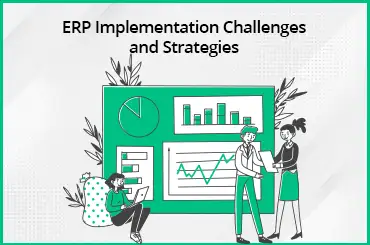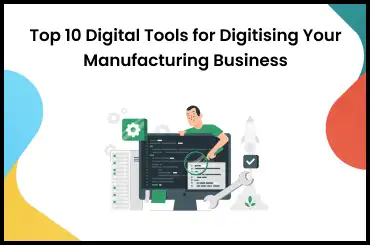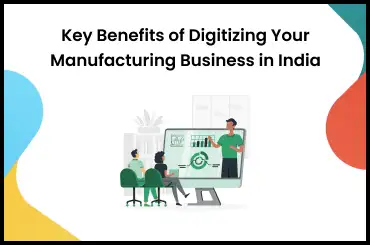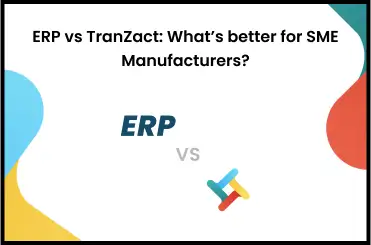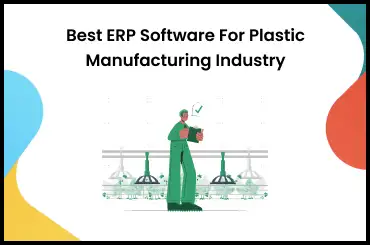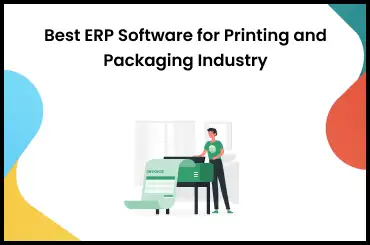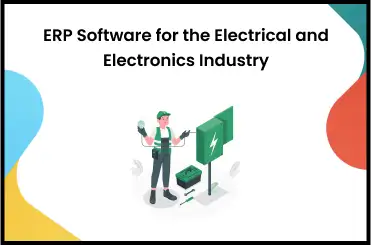As per a report by "Sage Software" on, more than 70% of businesses are using an ERP system today. If you are looking for the best ERP for a small business, this is the perfect guide for you.
In this blog post, you will understand the functions of an ERP and learn if you need an ERP system. We will also go through a step-by-step guide on how to find the best tool for your business and discuss some of the most important implementation techniques.
What Is an ERP System?
An Enterprise Resource Planning (ERP) system can be defined as an operations management tool for a manufacturing business. It lets a manufacturer integrate its core requirements like sales, inventory, production, planning and purchase etc. An ERP offers a centralized system to maintain various operational tasks of a manufacturer.
It simplifies your workflow and gives real-time insights into business management. This makes your manufacturing business efficient and lets you focus on creating better customer relationships.
The Need For ERP In Small Businesses
An ERP system for any small business can be of great benefit. Here are some reasons why you should switch to a software to manage your business:
1. Smooth Operations
An ERP Software for Small Businesses lets you collaborate between multiple departments. It creates a centralized system to manage all of them. It replaces the manual work, that can cause inefficiency and errors.
2. Data Visibility
ERP implementation allows you to access data in real-time. You can get accurate information for all departments. You can make the perfect decisions based on that information.
3. Inventory Management
With an ERP, you can minimize costs, avoid stockouts, and improve ordering. It lets small businesses track investments, payments, stock movements, and other processes with its real-time data visibility. You can also integrate a Barcode or RFID tracking system into it.
4. Compliance Regulation
Small businesses may face challenges when regulating tax compliance. Not following rules can lead to penalties and legal issues. Using an ERP system you can track the status of your payment with the payments module of an ERP. It also has the functionality to generate automated e-bills and GST invoices.
5. Customer Relationships
ERP software for businesses helps with better order fulfillment and faster responses. This step leads to customer satisfaction. You can fasten the delivery workflow as well. This system has the functionality of communication between in-house teams, suppliers, and vendors. This makes it communication easier and keeps everyone on the same page.
ERP Software Selection Criteria
If you are choosing an ERP system for a small business, you should make sure that the chosen ERP system matches your business needs. Here are some tips for the ERP software selection process:
1. Flexibility
All small businesses have different requirements and datasets. You should choose an ERP system that can customize itself for your needs. The ERP system should develop with your business.
2. Integration
You should understand its capability to integrate with other operational systems. These systems handle other departments of your enterprise while allowing communication between departments and processes.
3. Interface
ERP software should be easy to use and easily adaptable. It reduces training efforts and time too. You should choose an ERP software for business having custom options, admin dashboards, access control options, etc.
4. Growth
Your ERP system should have the capability to scale with your business. You should consider things like data volume and additional user access. Software should be able to work with new features that your business might need.
5. Low Cost
Another thing to consider is the cost of ERP software. You should also consider subscription costs, implementation costs, and training costs. To understand if your chosen ERP system is ideal, think about the return you are getting on your investment.
Steps To Choose the Right ERP System For Your Business
An ERP system can improve your business drastically. However, to get the best results, you need to choose the best ERP for small business. Here is a list of steps that may help you:
1. Understand Requirements
Before you choose the best ERP systems for your business, you should understand the requirements. Find out the challenges that your business faces that an ERP system can solve. Then, understand the goals you want to achieve with your stakeholders and department heads. These people include finance, operations, and IT.
2. Create Budget
An ERP Solution Software is an investment for your business. You have to consider the initial costs and other expenses. These include maintenance, budget, training, upgrades and other costs. You can create a budget with a detailed description of all business aspects.
3. Selection Criteria
The next step is to go on the internet and start your ERP selection process. Look for features, strengths, and weaknesses of each software. Do thorough research, contact the ERP platforms, and consult with experts selecting an ERP system.
4. Comparing Systems
You can compare ERP systems and find out the best fit for your business. Look for features like scalability and compatibility with business software. ERP software should support your business in the best way possible.
5. Testing System
Before implementing an ERP system, make sure to check the functions. You can perform system testing and user testing for your business and ERP software. Using real datasets will help you identify the drawbacks and workings of a system.
6. Hiring Experts
Your team should also understand how to work on the system. An ideal team includes IT professionals, project managers, and business unit representatives who understand your business wants. You can hire trainers or external consultants for training.
7. User Feedback
Every business can change strategies and improve user satisfaction. After the ERP system goes live, the focus should be on business optimization. Your team can monitor system performance. Take feedback from the users and identify areas for training.
Implementing Your Chosen ERP System
An ERP system implementation can become successful only if the team and stakeholders can collaborate. Finding the best ERP software should be a priority for any business looking for overall management. Here is a list of tips to follow while implementing your chosen ERP System:
- Define your goals and understand what problems can your ERP system solve. These functions include inventory management, accounting, and others.
- Create a team of experts from all departments and make sure they can align on department-related goals with your selected ERP solution software.
- You can create and specify deadlines, tasks, and resources for every process related and unrelated to the ERP system for management.
- If you are shifting from a traditional system to an ERP system, make sure that data transfer is complete.
- Communicate with your stakeholders throughout the ERP implementation process.
- Make use of all the features of an ERP system for business and fasten management, finances, accounting, and other processes.
- To avoid sudden changes in the system, provide time for every department to adapt. Consider gradual ERP implementation.
- Gather feedback from the ERP users in your business and make sure of improvements in the system and usage.
- Finally, examine how well the ERP system is working and prioritize the security of business data.
Better Than ERP for Manufacturers: TranZact
Finding the best erp systems for small business comes with a lot of challenges. You have to find one that offers the best integration capabilities. Furthermore, getting a system that can help you scale would be ideal for every small business.
However, not all businesses might be ready for an ERP. An ERP comes is a complete package and might not be required by an Indian SME manufacturer. Small manufacturers do not require all the functions and have less budget.
Software like TranZact can help here. TranZact is an easy-to-use software that provides 24*7 support. It is specifically made for Indian SMEs considering its affordability and 14-day implementation time. It lets you automate operations and get real-time insights into data anytime! Don't wait and try TranZact today!
FAQs
1. How do I choose the best ERP for my business?
Here is a list of steps that you can follow to choose the best ERP for your business:
- Identify your needs
- Create a Budget
- Research and compare software
- Get hands-on experience
2. What are the criteria for selecting an ERP system?
There are multiple criteria for selecting an ERP system. These include scalability, usability, functionality, integration, and if the platform's fee matches your budget.
3. What is an ERP software solution?
Enterprise Resource Planning (ERP) software provides you with a suite for business management. Businesses can integrate functions like finance, payments, accounts, inventory management, and customer relationship management.
4. What are the main 3 factors would you set for choosing an ERP system?
You should prioritize 3 factors when selecting an ERP system.
- Personal Budget
- Expertise and customer support
- Functionality
5. What are the 3 common types of ERP?
The 3 common types of ERP systems are:
- Cloud-based ERP
- On-premise ERP
- Hybrid ERP
6. What are the 7 steps for successful ERP implementation?
Here is a list of 7 steps that lead to successful ERP implementation.
- Planning your project
- Analyzing your business
- Migration of Data
- System Configuration
- Testing your system
- Launch system with defined support
- Getting user feedback
7. What to look for when buying an ERP system?
If you are buying an ERP system, you should look for functional aspects, potential business scalability, usability, and total cost of the system.
8. Why is ERP better than CRM?
ERP has better business management when compared to CRM. CRM is for managing customer interactions with sales pipelines. However, ERP is for the integration of most business management departments, including finance, accounting, inventory, and CRM.







